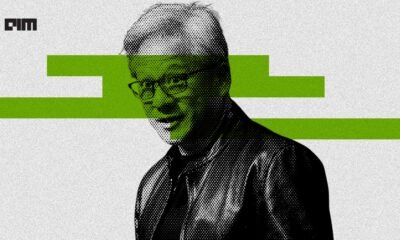Tools & Platforms
NVIDIA reportedly stops production of H20 AI chips

NVIDIA has reportedly asked its suppliers to halt production related to its H20 AI chips for the Chinese market. According to The Information, the company told Arizona-based Amkor Technology and Samsung Electronics to put a pause on their work for the H20. Amkor produces advanced packaging for the H20 chips, while Samsung supplies memory for NVIDIA. Reuters has also reported that NVIDIA asked Foxconn, which is in charge of backend processing for the chip, to suspend its work. “We constantly manage our supply chain to address market condition,” the company told CNBC in a statement when asked to comment about the supposed production pause.
The US government had blocked NVIDIA from selling the H20 in China back in April, out of concerns that the country could use it to develop AI tech for its military. It allowed the company to resume selling the chip in China by July, reportedly after closing a deal that would give it 15 percent of the sales. But China didn’t welcome the H20 with open arms. Local regulators instructed the biggest Chinese tech companies, including ByteDance and Alibaba to stop new orders for H20 chips, citing security concerns. The Cyberspace Administration of China talked to NVIDIA, claiming that AI experts had revealed that the chips could be tracked and controlled remotely. NVIDIA CEO Jensen Huang had admitted that Chinese regulators asked him about the supposed “backdoor” and said that he made it clear it didn’t exist. “Hopefully the response that we’ve given to the Chinese government will be sufficient,” Huang said.
A recent report by the Financial Times, however, claimed that Chinese authorities didn’t issue warnings against using NVIDIA chips just because of security concerns. Apparently, they found certain remarks by US commerce secretary Howard Lutnick “insulting.” When the US allowed shipments of the H20 to China again, Lutnick said during an interview: “We don’t sell them our best stuff, not our second best stuff, not even our third best. The fourth one down, we want to keep China using it… You want to sell the Chinese enough that their developers get addicted to the American technology stack.”
The H20 is currently the most advanced AI chip NVIDIA can sell in the Chinese market, but the company is reportedly developing a more powerful product. It will be based on the company’s Blackwell architecture, Reuters previously reported, and will be capable of half the computing power of NVIDIA’s Blackwell Ultra GPUs.
Tools & Platforms
AI: The new frontier at the Institute for Continued Learning in St. George – St. George News
Tools & Platforms
Colleges should go ‘medieval’ on students to beat AI cheating, NYU official says

Educators have been struggling over how students should or should not use artificial intelligence, but one New York University official suggests going old school—really, really old school.
In a New York Times op-ed on Tuesday, NYU’s vice provost for AI and technology in education, Clay Shirky, said he previously had counseled more “engaged uses” of AI where students use the technology to explore ideas and seek feedback, rather than “lazy AI use.”
But that didn’t work, as students continued using AI to write papers and skip the reading. Meanwhile, tools meant to detect AI cheating produce too many false positives to be reliable, he added.
“Now that most mental effort tied to writing is optional, we need new ways to require the work necessary for learning,” Shirky explained. “That means moving away from take-home assignments and essays and toward in-class blue book essays, oral examinations, required office hours and other assessments that call on students to demonstrate knowledge in real time.”
Such a shift would mark a return to much older practices that date back to Europe’s medieval era, when books were scarce and a university education focused on oral instruction instead of written assignments.
In medieval times, students often listened to teachers read from books, and some schools even discouraged students from writing down what they heard, Shirky said. The emphasis on writing came hundreds of years later in Europe and reached U.S. schools in the late 19th century.
“Which assignments are written and which are oral has shifted over the years,” he added. “It is shifting again, this time away from original student writing done outside class and toward something more interactive between student and professor or at least student and teaching assistant.”
That may entail device-free classrooms as some students have used AI chatbots to answer questions when called on during class.
He acknowledged logistical challenges given that some classes have hundreds of students. In addition, an emphasis on in-class performance favors some students more than others.
“Timed assessment may benefit students who are good at thinking quickly, not students who are good at thinking deeply,” Shirky said. “What we might call the medieval options are reactions to the sudden appearance of AI, an attempt to insist on students doing work, not just pantomiming it.”
To be sure, professors are also using AI, not just students. While some use it to help develop a course syllabus, others are using it to help grade essays. In some cases, that means AI is grading an AI-generated assignment.
AI use by educators has also generated backlash among students. A senior at Northeastern University even filed a formal complaint and demanded a tuition refund after discovering her professor was secretly using AI tools to generate lecture notes.
Meanwhile, students are also getting mixed messages, hearing that the use of AI in school counts as cheating but also that not being able to use AI will hurt their job prospects. At the same time, some schools have no guidelines on AI.
“Whatever happens next, students know AI is here to stay, even if that scares them,” Rachel Janfaza, founder of Gen Z-focused consulting firm Up and Up Strategies, wrote in the Washington Post on Thursday.
“They’re not asking for a one-size-fits-all approach, and they’re not all conspiring to figure out the bare minimum of work they can get away with. What they need is for adults to act like adults — and not leave it to the first wave of AI-native students to work out a technological revolution all by themselves.”
Tools & Platforms
SPU & RevisionSuccess lead AI workshop for student innovation

RevisionSuccess and Sripatum University (SPU) jointly hosted a workshop designed to introduce over 200 students to the applications of artificial intelligence (AI) in education and entrepreneurship.
The event, held at the School of Entrepreneurship on SPU’s Bangkok campus, was designed to provide students with practical experience using emerging digital tools. This workshop is part of an established collaboration between RevisionSuccess and SPU, which includes a formal Memorandum of Understanding, and builds on ongoing efforts to support educational advancement in Thailand.
Collaborative mission
The workshop carried the theme “AIvolution in Education,” focusing on how AI technology can personalise learning, increase engagement, and provide students with skills needed for both academic and professional pursuits. It also provided students with the opportunity to explore how AI can support entrepreneurial activities in a technology-focused business environment.
“Our partnership with RevisionSuccess has always been guided by a shared mission – to give students the tools they need to succeed in the digital age,” said Dr. Kriangkrai Satjaharuthai, Dean of the School of Entrepreneurship at SPU, who delivered the keynote address. “AI is not just a trend; it is becoming the backbone of future education and business. We want our students to be ready for this transformation, and today’s workshop has given them that first-hand experience.”
Hands-on experience
A key activity during the workshop was a large-scale, interactive game that involved all participating students. The game session was designed to demonstrate how AI-powered tools can enhance engagement and collaboration, providing students with a sense of how technology can bring learning concepts to life.
“We believe that learning should not only be effective but also fun, engaging, and scalable,” said Phonlawat Sirajindapirom of RevisionSuccess, who co-led the workshop alongside colleagues Phuwadit Sutthaporn and Pingkan Rerkpatanapipat. “Through this activity, students experienced how AI can bridge the gap between theory and practice, giving them practical insights into how innovation can be applied to their entrepreneurial journeys.”
AI supporting educators
The workshop speakers discussed the role of AI as a supplementary resource for teachers. They highlighted how AI can adapt instruction to individual student needs and simplify complex material, without attempting to replace educators themselves.
“Our role as educators is evolving,” added Dr. Kriangkrai. “Instead of being the sole source of information, we now serve as facilitators who help students use technology to unlock their potential. The key is to embrace AI as an ally, not a competitor.”
Pingkan Rerkpatanapipat of RevisionSuccess also commented on the potential of AI in shaping the learning environment.
“AI offers us the chance to reimagine the classroom – to create a space where learning adapts to the student, rather than the other way around. At RevisionSuccess, we are committed to working hand-in-hand with institutions like SPU to ensure that innovation leads to inclusion and accessibility for all students.”
Entrepreneurial focus
According to the organisers, the workshop’s emphasis on entrepreneurship aligned with national efforts in Thailand to strengthen digital skills and innovation. The agenda included demonstrations of AI as a business tool, intended to prepare students for future careers in a rapidly evolving market.
One student participant reflected on the benefits of the session, stating, “This workshop has broadened my perspective. I can see how AI can help me both in my studies and in the business I want to start after graduation. It makes learning more efficient and gives me new ideas for innovation.”
Feedback from participants indicates that the value students found in connecting their academic experience with real-world business concepts, enabled by AI technology, was significant.
Continuous development
The event concluded with a commemorative group photo featuring Dr. Kriangkrai, other faculty members, and the RevisionSuccess team. Organisers described this closing as a reflection of their commitment to continued collaboration in support of educational adaptation and progress.
“Our collaboration with SPU is about more than hosting events – it’s about creating a movement towards smarter, more inclusive, and more engaging education in Thailand,” said Phuwadit Sutthaporn of RevisionSuccess. “We are excited to continue building on this momentum with future initiatives.”
-
Tools & Platforms3 weeks ago
Building Trust in Military AI Starts with Opening the Black Box – War on the Rocks
-

 Business2 days ago
Business2 days agoThe Guardian view on Trump and the Fed: independence is no substitute for accountability | Editorial
-

 Ethics & Policy1 month ago
Ethics & Policy1 month agoSDAIA Supports Saudi Arabia’s Leadership in Shaping Global AI Ethics, Policy, and Research – وكالة الأنباء السعودية
-

 Events & Conferences3 months ago
Events & Conferences3 months agoJourney to 1000 models: Scaling Instagram’s recommendation system
-

 Jobs & Careers2 months ago
Jobs & Careers2 months agoMumbai-based Perplexity Alternative Has 60k+ Users Without Funding
-

 Education2 months ago
Education2 months agoVEX Robotics launches AI-powered classroom robotics system
-

 Funding & Business2 months ago
Funding & Business2 months agoKayak and Expedia race to build AI travel agents that turn social posts into itineraries
-

 Podcasts & Talks2 months ago
Podcasts & Talks2 months agoHappy 4th of July! 🎆 Made with Veo 3 in Gemini
-

 Podcasts & Talks2 months ago
Podcasts & Talks2 months agoOpenAI 🤝 @teamganassi
-

 Mergers & Acquisitions2 months ago
Mergers & Acquisitions2 months agoDonald Trump suggests US government review subsidies to Elon Musk’s companies






















